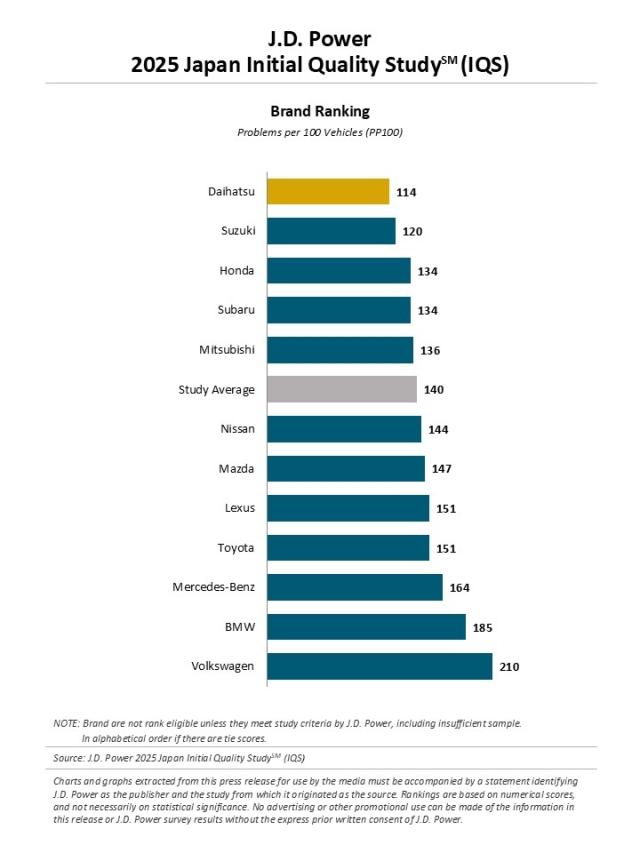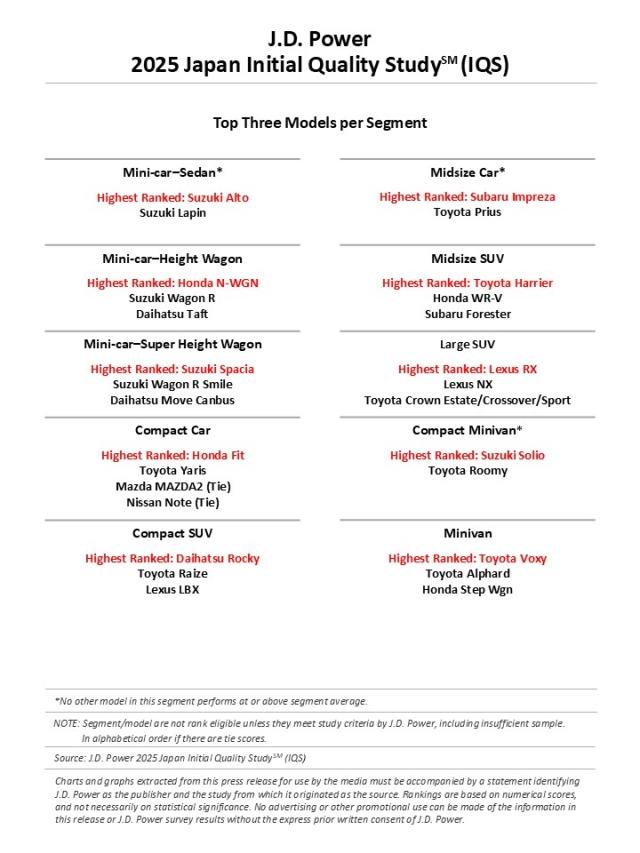Vehicle Initial Quality Improves Year over Year; Infotainment-Related Problems Decline in Frequency but Still Remain the Most Problematic, JD Power Finds
Daihatsu Ranks Highest Overall in Initial Quality
TOKYO: 30 September 2025 — Overall vehicle initial quality in Japan has improved for the first time in four years, yet infotainment-related problems remain the most frequently reported by vehicle owners, challenging automakers to further improve quality. This year, initial quality averages 140 problems per 100 vehicles (PP100), an improvement of 12 PP100 from 2024, according to the JD Power 2025 Japan Initial Quality StudySM (IQS), released today. These findings follow four consecutive years of year-over-year problem increases since 2021, when the study was redesigned. Lower PP100 reflects higher vehicle quality.
A large portion of problems owners experience are design-related (108.5 PP100), including features that are difficult to understand or use. Although this has improved by 9.3 PP100 since 2024, design-related problems remain the most frequently reported by vehicle owners. Features that are hard to understand or difficult to use continue to be a major challenge in vehicle quality. Meanwhile, defects and malfunctions, including those features that vehicle owners indicate are broken/not working, have improved by 2.8 PP100, reaching 29.0 PP100 in 2025.
“Although problems related to driving assistance have been decreasing, the number of problems still remains high and requires further improvement,” said Taku Kimoto, Japan CEO at JD Power. “Additionally, as infotainment and driving assistance technologies have improved in quality, dissatisfaction with small, everyday features has notably increased. Cupholders in particular draw attention, not only because of poorly placed installations or insufficient numbers due to design or shape constraints, but also because they are awkward or impractical to use. These minor inconveniences and user-unfriendliness are more apparent precisely because they are encountered frequently in daily use and need to be addressed by automakers before moving on to improve technological advancements.”
Following are key findings of the 2025 study:
- Daihatsu ranks highest in overall initial quality: Among the 12 brands included in the study, Daihatsu has the fewest problems (114 PP100).
- Infotainment remains the most problematic category despite improvements: Among the nine study categories, infotainment continues to be the most problematic, with 28.7 PP100. While this represents a decrease of 2.5 PP100 compared with 2024, the persistently high number of problems highlights a critical challenge in improving vehicle quality. Within this category, the gap this year between the brand with the fewest problems (18.6 PP100) and the brand with the highest problems (65.2 PP100) remains wide, though it has narrowed significantly to 46.6 PP100 from 80.0 PP100 in 2024.
- Lane departure warning problems improve: The feature for lane departure warning/lane keeping assistance, previously the most problematic, has shown an improvement of 0.8 PP100, reaching 3.6 PP100.
Highest-Ranking Brands and Models
Daihatsu is the highest-ranking brand overall in initial quality with 114 PP100. Suzuki (120 PP100) ranks second and Honda (134 PP100) ranks third.
The luxury brand segment is not eligible for awards this year because the ranking criteria were not met.
By segment, the highest-ranking models are:
- Mini-car–Sedan: Suzuki Alt
- Mini-car–Height Wagon: Honda N-WGN
- Mini-car–Super Height Wagon: Suzuki Spacia
- Compact Car: Honda Fit
- Compact SUV: Daihatsu Rocky
- Midsize Car: Subaru Impreza
- Midsize SUV: Toyota Harrier
- Large SUV: Lexus RX
- Compact Minivan: Suzuki Solio
- Minivan: Toyota Voxy
- Large Car: Not eligible for award because the ranking criteria were not met
The Japan Initial Quality Study (IQS) is now in its 15th year. The study measures problems experienced by owners of new vehicles in the first two to 13 months of ownership. Initial quality is determined by the number of problems experienced per 100 vehicles, with a lower PP100 reflecting higher quality.
The 2025 study is based on responses from 20,101 owners of new vehicles in the first two to nine months of ownership. Vehicle quality is evaluated by owners across 225 problems organized into nine vehicle categories: infotainment; features, controls and displays; exterior; driving assistance; interior; powertrain; seats; driving experience; and climate. The study was fielded in May through June 2025.
About JD Power
JD Power is a global leader in automotive data and analytics, and provides industry intelligence, consumer insights and advisory solutions to the automotive industry and selected non-automotive industries. JD Power leverages its extensive proprietary datasets and software capabilities combined with advanced analytics and artificial intelligence tools to help its clients optimize business performance.
JD Power was founded in 1968 and has offices in North America, Europe and Asia Pacific. To learn more about the company’s business offerings, visit https://japan.jdpower.com/.
Media Relations Contacts
Kumi Kitami; JD Power, Japan; 81-3-6809-2996; release@jdpa.com
Joe LaMuraglia; JD Power, USA; 714-621-6224; media.relations@jdpa.com
About JD Power and Advertising/Promotional Rules www.jdpower.com/business/about-us/press-release-info

